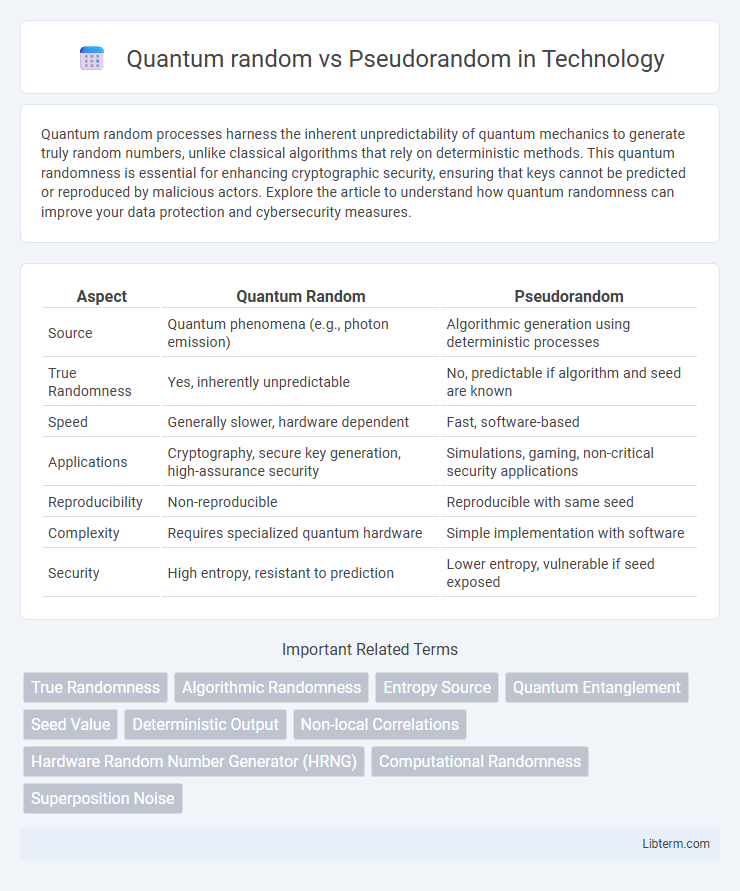Quantum random processes harness the inherent unpredictability of quantum mechanics to generate truly random numbers, unlike classical algorithms that rely on deterministic methods. This quantum randomness is essential for enhancing cryptographic security, ensuring that keys cannot be predicted or reproduced by malicious actors. Explore the article to understand how quantum randomness can improve your data protection and cybersecurity measures.
Table of Comparison
| Aspect | Quantum Random | Pseudorandom |
|---|---|---|
| Source | Quantum phenomena (e.g., photon emission) | Algorithmic generation using deterministic processes |
| True Randomness | Yes, inherently unpredictable | No, predictable if algorithm and seed are known |
| Speed | Generally slower, hardware dependent | Fast, software-based |
| Applications | Cryptography, secure key generation, high-assurance security | Simulations, gaming, non-critical security applications |
| Reproducibility | Non-reproducible | Reproducible with same seed |
| Complexity | Requires specialized quantum hardware | Simple implementation with software |
| Security | High entropy, resistant to prediction | Lower entropy, vulnerable if seed exposed |
Introduction to Randomness in Computing
Randomness in computing plays a crucial role in algorithms, cryptography, and simulations, distinguishing between quantum random and pseudorandom number generation. Quantum random generators harness inherent quantum phenomena, producing truly unpredictable and non-deterministic sequences, whereas pseudorandom generators use deterministic algorithms to create sequences that only appear random. This distinction impacts security, complexity, and reliability, making quantum randomness essential for high-stakes applications requiring true unpredictability.
Defining Quantum Randomness
Quantum randomness arises from the inherent unpredictability of quantum phenomena, such as the superposition and collapse of quantum states during measurement, producing true random numbers that cannot be deterministically replicated. In contrast, pseudorandom numbers are generated using algorithms and deterministic processes, making them predictable if the initial seed and method are known. Quantum random number generators leverage quantum mechanical processes to ensure genuine randomness crucial for cryptographic security and advanced simulations.
Understanding Pseudorandomness
Pseudorandomness refers to number sequences generated by deterministic algorithms that simulate randomness, but are fully reproducible given the initial seed value. Unlike quantum random numbers, which derive unpredictability from inherent quantum phenomena, pseudorandom number generators (PRNGs) rely on mathematical formulas to produce outputs that appear statistically random. Understanding pseudorandomness is crucial in cryptography, simulations, and gaming, where the balance between computational efficiency and unpredictability is essential.
Key Differences Between Quantum and Pseudorandom Generators
Quantum random generators utilize inherently unpredictable quantum phenomena, such as photon behavior or electron spin, to produce truly random sequences, ensuring higher entropy and security. Pseudorandom generators rely on deterministic algorithms and initial seeds, which can be replicated or predicted if the seed and algorithm are known, leading to potential vulnerabilities. The key difference lies in the source of randomness: quantum methods harness physical uncertainty, while pseudorandom methods simulate randomness computationally.
Applications of Quantum Random Numbers
Quantum random numbers, generated through inherent quantum phenomena like photon detection or quantum vacuum fluctuations, provide true randomness essential for cryptographic protocols, secure key generation, and enhancing cybersecurity measures. Unlike pseudorandom numbers derived from deterministic algorithms, quantum random numbers are unpredictable and non-reproducible, making them crucial for applications in quantum key distribution, secure communications, and randomized cryptographic defenses. Industries such as finance, telecommunications, and advanced scientific simulations benefit from quantum randomness by improving encryption robustness and ensuring higher levels of data security.
Common Uses of Pseudorandom Numbers
Pseudorandom numbers, generated by deterministic algorithms such as Linear Congruential Generators and Mersenne Twister, are widely used in computer simulations, cryptographic protocols, and procedural content generation in video games due to their efficiency and reproducibility. These numbers approximate randomness closely enough for applications where absolute unpredictability is not critical, enabling complex modeling in scientific research and reliable randomization in statistical sampling. Common use cases include Monte Carlo simulations, randomized algorithms, and encryption key generation where speed and ease of implementation outweigh the need for true quantum randomness.
Security Implications: Quantum vs. Pseudorandom
Quantum random number generators leverage inherent quantum unpredictability, producing truly random sequences crucial for cryptographic protocols, enhancing security by eliminating predictable patterns present in pseudorandom number generators (PRNGs). PRNGs rely on deterministic algorithms and initial seed values, making them susceptible to reverse engineering and attacks if the seed is compromised, thereby reducing overall cryptographic strength. The inherent non-determinism of quantum randomness significantly mitigates risks of predictability, improving secure key generation and encryption resilience against advanced cyber threats.
Limitations and Challenges in Both Approaches
Quantum random number generators (QRNGs) face challenges including hardware complexity, susceptibility to environmental noise, and limited scalability, which can impact the purity and speed of true randomness generation. Pseudorandom number generators (PRNGs) rely on deterministic algorithms and initial seed values, leading to predictability and potential vulnerabilities in cryptographic applications. Both QRNGs and PRNGs struggle with balancing entropy sources and computational efficiency, necessitating ongoing research to enhance robustness and reliability in secure systems.
Future Prospects in Random Number Generation
Quantum random number generation leverages inherent quantum indeterminacy to produce truly unpredictable sequences, ensuring higher security and reliability in cryptographic applications. Pseudorandom number generators, while efficient and widely used, rely on deterministic algorithms that can be vulnerable to prediction and attacks as computational power advances. Future prospects emphasize integrating quantum-based methods into hybrid systems to enhance randomness quality and support emerging technologies like quantum computing and secure communications.
Conclusion: Choosing the Right Randomness
Quantum random number generators produce truly unpredictable sequences based on quantum phenomena, ensuring maximum entropy and security for cryptographic applications. Pseudorandom generators use deterministic algorithms that can be reproduced if the seed is known, making them suitable for simulations and tasks requiring reproducibility. Selecting the appropriate randomness depends on the need for absolute unpredictability versus efficiency and repeatability.
Quantum random Infographic

 libterm.com
libterm.com